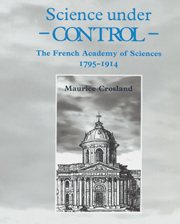Book contents
- Frontmatter
- Contents
- List of tables and figures
- Preface
- List of abbreviations
- INTRODUCTION
- 1 SCIENCE IN FRANCE
- 2 THE STRUCTURE OF THE ACADEMY
- 3 THE FUNCTIONING OF THE ACADEMY: SOME POSSIBLE ROLES
- 4 SCIENCE DIVIDED: THE SECTIONS
- 5 THE ACADEMICIANS
- 6 ELECTIONS: ‘GREEN FEVER’
- 7 REGISTRATION, JUDGEMENT AND REWARD
- 8 THE PRINTED WORD
- 9 AN ACADEMY UNDER GOVERNMENT CONTROL
- 10 ‘OUTSIDERS’: THE SCIENTIFIC FRINGE AND THE PUBLIC
- 11 THE INTERNATIONAL DIMENSION
- 12 THE CONTROL OF THE ACADEMY AND OF SCIENCE
- Name index
- Subject index
7 - REGISTRATION, JUDGEMENT AND REWARD
Published online by Cambridge University Press: 09 October 2009
- Frontmatter
- Contents
- List of tables and figures
- Preface
- List of abbreviations
- INTRODUCTION
- 1 SCIENCE IN FRANCE
- 2 THE STRUCTURE OF THE ACADEMY
- 3 THE FUNCTIONING OF THE ACADEMY: SOME POSSIBLE ROLES
- 4 SCIENCE DIVIDED: THE SECTIONS
- 5 THE ACADEMICIANS
- 6 ELECTIONS: ‘GREEN FEVER’
- 7 REGISTRATION, JUDGEMENT AND REWARD
- 8 THE PRINTED WORD
- 9 AN ACADEMY UNDER GOVERNMENT CONTROL
- 10 ‘OUTSIDERS’: THE SCIENTIFIC FRINGE AND THE PUBLIC
- 11 THE INTERNATIONAL DIMENSION
- 12 THE CONTROL OF THE ACADEMY AND OF SCIENCE
- Name index
- Subject index
Summary
It is above all by its Reports that the Academy can exercise great influence over the direction of people's minds in scientific research.
(A.S., Comité secret, 1845–56, p. 124, 2 April 1849.)The Academy has always reserved for itself the right to establish the laws of science … The Academy is … the implacable enemy of theories [unsupported by good experimental evidence].
(Liebig in private letters to Gerhardt, 1839, 1840, quoted by Schutzenberger, Inauguration du buste de Balard, 1896, pp. 11–12.)In the old days savants received pensions; today the Academy awards them prizes; this is surely the most noble and precious privilege of our organisation. It would be of interest to research how this patronage of science, which the Academy exercises and which is so extensive and so useful, has developed over the years.
(Fremy's speech at Séance publique, 27 December 1875, C.R., 81 (1875), 1285.)A registration bureau
Two of the most important functions of the Academy were to receive and to authenticate new scientific information. In addition the Academy was able to offer a whole range of rewards for good work. We will consider first the Academy's function as a registration bureau. It is useful to have in every advanced country a central agency for the collection of scientific information. The Academy fulfilled this function well and indeed, if it had not existed, it might have been necessary to invent it. That is to say that if there had not existed one elite body of scientists at the centre of scientific communication, there would have been a strong case to establish a government agency, probably staffed by civil servants.
- Type
- Chapter
- Information
- Science under ControlThe French Academy of Sciences 1795–1914, pp. 242 - 278Publisher: Cambridge University PressPrint publication year: 1992



